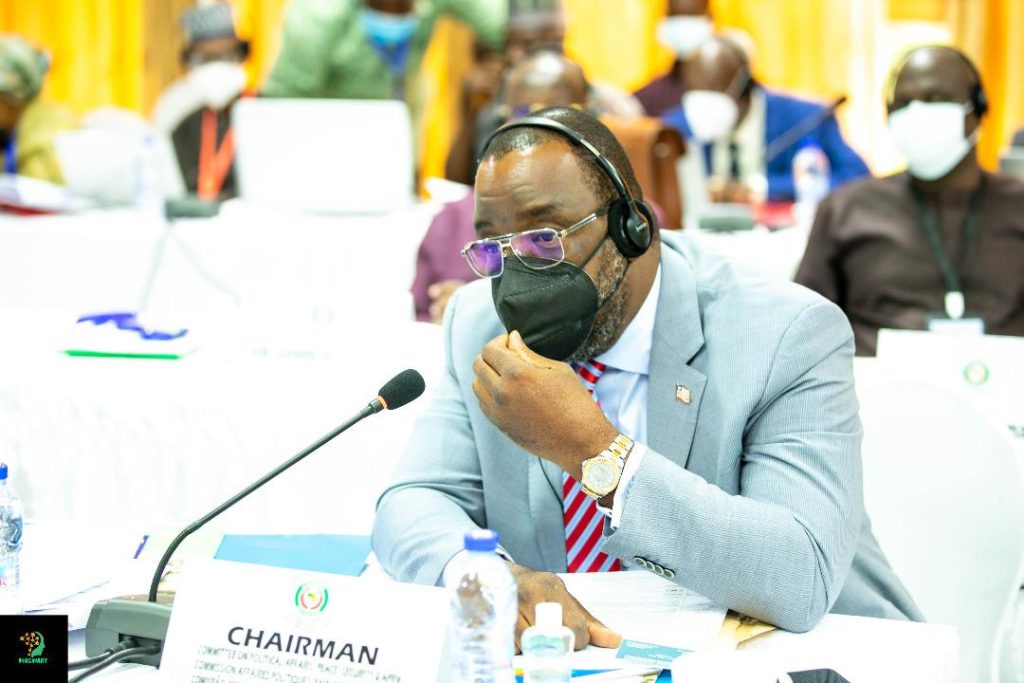Senator Edwin Melvin Snowe Jr.’s dual role as a Liberian lawmaker and a member of the ECOWAS Parliament’s Security Committee has placed him in a precarious position. His recent public statements, allegedly supporting the overthrow of the Liberian government, have drawn significant criticism and raised concerns about his suitability for his ECOWAS role. This situation necessitates a thorough examination of the implications of his actions, focusing on the potential damage to his credibility, the stability of Liberia, and the integrity of ECOWAS itself. The gravity of the situation warrants his consideration of resigning from his ECOWAS position.
Senator Snowe’s remarks constitute a breach of diplomatic protocol. ECOWAS, founded on principles of peace, democracy, and non-interference, expects its parliamentarians, especially those on the Security Committee, to maintain neutrality and professionalism. Advocating for regime change in a member state directly contradicts these core tenets, undermining ECOWAS’s authority and credibility. Such actions erode the organization’s ability to promote stability and peaceful resolutions to conflicts within the region. This breach of protocol necessitates a decisive response to reaffirm ECOWAS’s commitment to its founding principles.
The Senator’s involvement in mediating conflicts in Mali, Guinea, and Burkina Faso adds another layer of complexity. His public statements jeopardize his neutrality and effectiveness in future peace negotiations. Impartiality is paramount in conflict resolution, and his perceived bias undermines his ability to mediate credibly. This not only diminishes his personal role but also weakens ECOWAS’s capacity to address regional crises effectively. Maintaining the perception of neutrality is essential for successful mediation, and his actions have cast a long shadow over his future contributions to regional stability.
Furthermore, Senator Snowe’s access to sensitive security information raises concerns about the potential consequences of his remarks. In fragile post-conflict states like Liberia, inflammatory statements from influential figures can escalate tensions, embolden opposition groups, and be misinterpreted by external actors. This could destabilize the already delicate political climate in Liberia and potentially have ripple effects throughout the West African sub-region. The potential for unintended consequences underscores the need for responsible and measured public pronouncements, especially from individuals with access to sensitive information.
The ECOWAS Parliament operates under a strict code of conduct emphasizing impartiality, confidentiality, and ethical responsibility. Senator Snowe’s remarks appear to violate these standards, warranting a disciplinary review. If found in breach, ECOWAS may impose sanctions or recommend his resignation to preserve the organization’s integrity. Upholding these standards is crucial for maintaining public trust and ensuring the effectiveness of the organization’s operations. A failure to address such violations would undermine ECOWAS’s credibility and its ability to enforce its own rules.
Senator Snowe’s dual roles as a Liberian senator and an ECOWAS diplomat create a conflict of interest. His statements, with clear domestic political implications, compromise his ability to serve ECOWAS impartially. This further strengthens the argument for his resignation or, at the very least, temporary recusal from his ECOWAS duties until the matter is thoroughly investigated. Maintaining a clear separation between national political interests and regional responsibilities is essential for the effective functioning of ECOWAS and the preservation of its neutrality.
The historical precedents of similar rhetoric contributing to instability in West Africa, such as in Mali, Burkina Faso, and Guinea, highlight the potential dangers of Senator Snowe’s actions. In these cases, inflammatory statements by political elites fueled unrest and created an environment conducive to military intervention. These examples underscore the importance of responsible public discourse and the potential consequences of reckless rhetoric, particularly from individuals in positions of influence. Senator Snowe’s statements should be viewed within this context, and the potential for similar destabilizing effects in Liberia should not be underestimated.
In conclusion, Senator Snowe’s remarks are incompatible with his responsibilities and the ethical standards of his ECOWAS position. His actions raise serious concerns about his judgment, his commitment to ECOWAS principles, and his potential to further destabilize the region. In the interest of regional stability, institutional credibility, and diplomatic integrity, he should strongly consider resigning from the ECOWAS Security Committee. At a minimum, a thorough investigation by the ECOWAS Parliament is warranted, and Senator Snowe should be asked to step aside temporarily during this process. This is essential not only for internal accountability but also to demonstrate ECOWAS’s commitment to upholding the highest standards of diplomatic conduct. The peace and stability of West Africa rely on its leaders prioritizing regional interests over national politics, and it is imperative that ECOWAS takes decisive action to address this situation and reaffirm its commitment to its founding principles.


